|
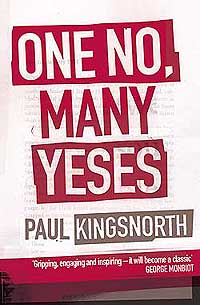 One No, many Yeses
One No, many Yeses
by Paul Kingsnorth, Free Press
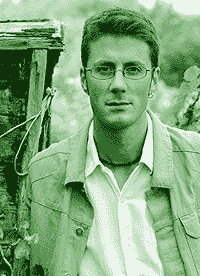 Kingsnorth has the repetitive habit of ending every other paragraph with a short, romantically revolutionary phrase, along the lines of: What Kalle Lasn calls the second American Revolution - a struggle to decommodify The People - appears to have begun.
These little passages, as unnecessary as they are unrealistic, infest the entire text and are indicative of the overall problem that rather than a book of any insight, he has written a champagne socialist's travel guide.
Apparently aiming his work at the younger, idealist members of the anti-capitalist movement, Kingsnorth travelled across five continents, talking to revolutionaries and reformists, staying briefly with them and documenting what they thought their parts of the anti-globalisation movement were all about.
Alongside the obligatory statistics on world hunger, poverty, and the disparity of wealth, he offers an appraisal - one which is already becoming out of date - of where it's all going and where it all came from.
Unfortunately Kingsnorth fails as a historian, writing vapid, misleading backgrounds on the World Social Forum, Seattle, Genoa, and the history of struggle itself.
He fails as a theoretician, spouting revolutionary jargon while spending most of the last chapter of his book calling for a relatively timid reform of some existing institutions, rather than truly challenge the power structures backing their inhumanity.
He certainly fails as an analyst of what he has seen, offering only trite and patronising sympathy with third and second world poverty from his high edifice as a worldly-wise westerner.
He sidelines anarchism, happily talking about the violence of the black blocs, while mentioning people he likes as those who 'claim' to be anarchists. As he talks admiringly about the non-hierarchical basis of the anti-globalisation movement, this airbrushing forms a large black hole in One No, many Yeses' makeup.
Where his work succeeds, and importantly so, is as a source of useful information and as a series of journalistic case studies.
He has a knack of getting hold of interesting activists throughout his travels. He has an impressive network of contacts and no small amount of bravery in tracking down people who have been on the run for years in countries with extremely repressive regimes.
There are some interesting insights from the people he talks to, though Kingsnorth himself has almost no merit when trying to translate those words into his world view.
Although his research seems questionable, particularly with regards to how the Seattle riots functioned, on the assumption the people he is talking to have explained their situations to him, the background on countries such as South Africa and particularly Papua are invaluable for the stark illustrations they present of how some aspects of capitalism work, and can be overcome.
What kept me reading was the volume of firsthand sources he found, and the information they gave him, but donít expect a 'gripping, engaging and inspiring' (according to George Monbiot) classic.
Review: RR
Kingsnorth has the repetitive habit of ending every other paragraph with a short, romantically revolutionary phrase, along the lines of: What Kalle Lasn calls the second American Revolution - a struggle to decommodify The People - appears to have begun.
These little passages, as unnecessary as they are unrealistic, infest the entire text and are indicative of the overall problem that rather than a book of any insight, he has written a champagne socialist's travel guide.
Apparently aiming his work at the younger, idealist members of the anti-capitalist movement, Kingsnorth travelled across five continents, talking to revolutionaries and reformists, staying briefly with them and documenting what they thought their parts of the anti-globalisation movement were all about.
Alongside the obligatory statistics on world hunger, poverty, and the disparity of wealth, he offers an appraisal - one which is already becoming out of date - of where it's all going and where it all came from.
Unfortunately Kingsnorth fails as a historian, writing vapid, misleading backgrounds on the World Social Forum, Seattle, Genoa, and the history of struggle itself.
He fails as a theoretician, spouting revolutionary jargon while spending most of the last chapter of his book calling for a relatively timid reform of some existing institutions, rather than truly challenge the power structures backing their inhumanity.
He certainly fails as an analyst of what he has seen, offering only trite and patronising sympathy with third and second world poverty from his high edifice as a worldly-wise westerner.
He sidelines anarchism, happily talking about the violence of the black blocs, while mentioning people he likes as those who 'claim' to be anarchists. As he talks admiringly about the non-hierarchical basis of the anti-globalisation movement, this airbrushing forms a large black hole in One No, many Yeses' makeup.
Where his work succeeds, and importantly so, is as a source of useful information and as a series of journalistic case studies.
He has a knack of getting hold of interesting activists throughout his travels. He has an impressive network of contacts and no small amount of bravery in tracking down people who have been on the run for years in countries with extremely repressive regimes.
There are some interesting insights from the people he talks to, though Kingsnorth himself has almost no merit when trying to translate those words into his world view.
Although his research seems questionable, particularly with regards to how the Seattle riots functioned, on the assumption the people he is talking to have explained their situations to him, the background on countries such as South Africa and particularly Papua are invaluable for the stark illustrations they present of how some aspects of capitalism work, and can be overcome.
What kept me reading was the volume of firsthand sources he found, and the information they gave him, but donít expect a 'gripping, engaging and inspiring' (according to George Monbiot) classic.
Review: RR
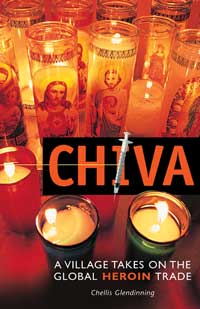 Chiva:
Chiva:
A Village takes on the Global Heroin Trade
by Chellis Glendinning, New Society Publishers
The dragon is an important symbol here. It has associations of several kinds with opium and with heroin. It also has associations with how humans relate to the world around them. Chiva is the story of a village and how that village came to chase the dragon and then embrace it.
Chellis Glendinning writes: 'The result is a battle: between human and nature, intellect and feeling, refined and gross, righteous and enemy - and in the world of illicit substances, with Archangel Michael brandishing His sword for law and order against the fiery antagonist'. Glendinning puts the dragon back on its lofty pedestal among the people, so this is a story about healing and specifically about the healing process. The story of heroin is also the story of colonization, 'of generations of tribal and land-based peoples in India, Turkey, Southeast Asia, Afghanistan, the Andes and Mexico'. Likewise the healing is the story of decolonization and a return to a communal land-based culture.
Review: RA
Chellis Glendinning is interviewed in BLUE
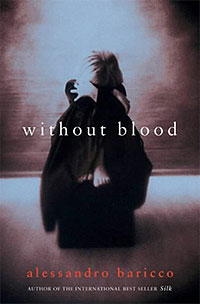 Without Blood
Without Blood
by Alessandro Baricco, Canongate
Vengeance is a human emotion as old as the species. But it is also human to forgive, to stop or to look back not in anger but in sorrow and say enough, no more, there is another way. Revenge and redemption are the two sides of the same coin, we are told. If we survive and when we are older we see the futility of it all.
Alessandro Baricco's Without Blood, delicately translated from the Italian by Ann Goldstein, has been described as a fable, as a book rooted in the European literary tradition, a story about damage and forgiveness. At first this is what Baricco's short novel seems to be about, a lifelong journey towards the satisfying moment of vengeance. Until that moment comes and the reader begins to realise that the author has a different design. It comes on the last page and it is worth waiting for. Of course Baricco's denouement would not have worked if the novel had been longer but it works because his beautifully crafted prose is both minimalist and visual. Without Blood proves that literature is not dead, at least not on the European mainland where the weight of good storytelling bears down on the cultures of a continent still healing itself after centuries of conflict.
Review: RA
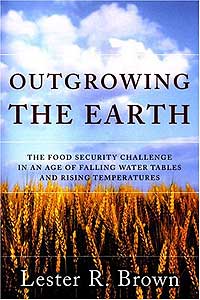 Outgrowing the Earth
Outgrowing the Earth
The Food Security Challenge in an Age of
Falling Water Tables and Rising Temperatures
by Lester R Brown, Earthscan, Earth Policy
Lester Brown has been stating the obvious for so long now he is beginning to sound boring. By his own admission he has been involved in "some 50 titles". Many of these titles have been translated into other languages, up to 40 and as many as 28, which is the number of publishers putting out the State of the World annual Brown started back in 1983. Brown has since left the Worldwatch Institute, the authors of the State of the World and Vital Signs annuals, and founded the Earth Policy Institute, which is now producing books that are aimed specifically at policy makers. Because Brown states the obvious he has been described by the Washington Post as "one of the world's most influential thinkers", yet somehow this thinking he does is still not enough to convince the policy makers of the world that they need to read what Brown is thinking about.
And what he is thinking about is a world that is nearing collapse. Water tables are falling while temperatures are rising making it harder than ever to grow food for a global population that is, quite simply, "outgrowing the earth". Brown is looking for strong leadership to save the planet because he fears we no longer have food security. The problem is that Brown is not the only thinker who needs to be listened to. There is a young generation out there that understands the meaning of the slogan, Food Not Bombs, who cannot understand why it is a crime to provide food for people and not a crime to kill thousands in the name of home security.
Review: RA
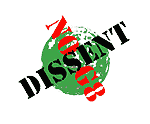 Arguments Against G8
Arguments Against G8
(edited by) Gill Hubbard and David Miller, Pluto Press
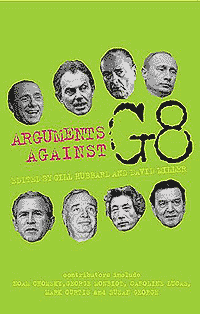 Aimed at Britain's neo-liberals rather than a general audience, Arguments Against G8 indicts the usual suspects, the men who lead the G8 group of nations - Britain, Canada, France, Germany, Italy, Japan, Russia and the United States. It has been compiled by two academics, David Miller, Professor of Sociology at the University of Strathclyde, who is also a co-founder of the media monitor, Spinwatch, and by Gill Hubbard, a member of Globalise Resistance Scotland and G8 Alternatives. It features the usual western hemisphere neo-liberal commentators, notably Noam Chomsky, Susan George and George Monbiot, but significantly it features essays by Haidi Giuliani (the 61 year old mother of Carlo, murdered by police in Genoa on 20 July 2001 at a time of protests against a previous summit), Bob Crow (a former London Underground rail worker and now General Secretary of the National Union of Rail, Maritime and Transport Workers), Tommy Sheridan (Scottish Socialist Party member of the Scottish Parliament) and Salma Yaqoob (chair of Birmingham's Stop the War Coalition and a member of Respect).
The essays by Giuliani (on Genoa), Crow (on Privatisation and workers' rights), Sheridan (on Poverty) and Yaqoob (on Racism, Asylum and Immigration) are worth the price of the book because they reflect opinions not heard among the neo-liberal revisionists of Western Civilisation and particularly in the consumer-led, hierarchical British media. The likes of Chomsky, George and significantly Monbiot are frequently heard in the neo-liberal British media, not least of all in The Guardian, which claims an authoritarian position on all the movements struggling to have their voices heard on the issues of globalisation, war, corporate power, democracy, climate change, trade, food security, racism, immigration, privatisation, workers' rights, poverty, debt, health and where we go from here - all discussed by the authors Miller and Hubbard have brought together in this book.
Media is of course a key issue in the struggle against the power of the G8 and their corporate allies. Miller's Spinwatch purports to "provide public interest research and reporting on corporate and government public relations and propaganda", an age-old hobby in Britain that has never made any kind of dent on the way Britain's media functions. In their introduction, Barbarism Inc, the editors accuse Britain of failing to fulfil its ecological and social obligations to the rest of the world and criticise its government, soon to be tested in the polls, for its role in the so-called "war against terror" despite opposition from the general population against the war. But this book is not just about Britain's neo-liberal society and those who would seek to change it to their social advantage, it is about the G8 and why these countries abuse their power. And if we are to believe Miller and Hubbard, there will be a "massive" mobilisation in Scotland in the summer of 2005 against that abuse.
Review: RA
Aimed at Britain's neo-liberals rather than a general audience, Arguments Against G8 indicts the usual suspects, the men who lead the G8 group of nations - Britain, Canada, France, Germany, Italy, Japan, Russia and the United States. It has been compiled by two academics, David Miller, Professor of Sociology at the University of Strathclyde, who is also a co-founder of the media monitor, Spinwatch, and by Gill Hubbard, a member of Globalise Resistance Scotland and G8 Alternatives. It features the usual western hemisphere neo-liberal commentators, notably Noam Chomsky, Susan George and George Monbiot, but significantly it features essays by Haidi Giuliani (the 61 year old mother of Carlo, murdered by police in Genoa on 20 July 2001 at a time of protests against a previous summit), Bob Crow (a former London Underground rail worker and now General Secretary of the National Union of Rail, Maritime and Transport Workers), Tommy Sheridan (Scottish Socialist Party member of the Scottish Parliament) and Salma Yaqoob (chair of Birmingham's Stop the War Coalition and a member of Respect).
The essays by Giuliani (on Genoa), Crow (on Privatisation and workers' rights), Sheridan (on Poverty) and Yaqoob (on Racism, Asylum and Immigration) are worth the price of the book because they reflect opinions not heard among the neo-liberal revisionists of Western Civilisation and particularly in the consumer-led, hierarchical British media. The likes of Chomsky, George and significantly Monbiot are frequently heard in the neo-liberal British media, not least of all in The Guardian, which claims an authoritarian position on all the movements struggling to have their voices heard on the issues of globalisation, war, corporate power, democracy, climate change, trade, food security, racism, immigration, privatisation, workers' rights, poverty, debt, health and where we go from here - all discussed by the authors Miller and Hubbard have brought together in this book.
Media is of course a key issue in the struggle against the power of the G8 and their corporate allies. Miller's Spinwatch purports to "provide public interest research and reporting on corporate and government public relations and propaganda", an age-old hobby in Britain that has never made any kind of dent on the way Britain's media functions. In their introduction, Barbarism Inc, the editors accuse Britain of failing to fulfil its ecological and social obligations to the rest of the world and criticise its government, soon to be tested in the polls, for its role in the so-called "war against terror" despite opposition from the general population against the war. But this book is not just about Britain's neo-liberal society and those who would seek to change it to their social advantage, it is about the G8 and why these countries abuse their power. And if we are to believe Miller and Hubbard, there will be a "massive" mobilisation in Scotland in the summer of 2005 against that abuse.
Review: RA
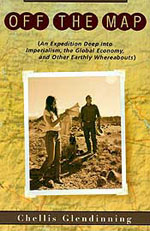 Off the Map:
Off the Map:
An Expedition deep into Empire and the Global Economy
by Chellis Glendinning, New Society Publishers
Chellis Glendinning lives in northern New Mexico, a place you might say is off the map, but it isn't. There is nowhere that is off the map, at least not physically, anymore.
Our world has been mapped, our lives have been mapped and to resist this element of empire, which "originates in the perception of place" is futile. To go on this expedition deep into empire and the global economy the reader must quickly acknowledge that the author equates the world we live in to one that is damaging every aspect of our being. Her earlier work, My Name is Chellis and I'm in Recovery from Western Civilisation, describes the trauma we all suffer from - whether we believe it or not. The question is, what if the map didn't exist.
Review: RA
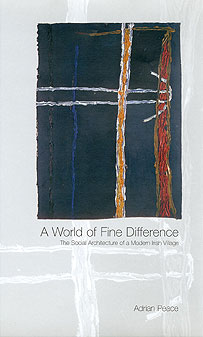 A World of Fine Difference:
A World of Fine Difference:
The Social Architecture of a Modern Irish Village
by Adrian Peace, UCD Press
Anthropologist Adrian Peace calls his study village Inveresk - "the inlet of the fish". It is a fictional name, as are all the names of the people and some of the other places in this book. It does not matter that he cannot identify the actual village, because the social patterns he describes resonate through much of Irish life, rural and urban. But his study community is unique - hence his "world of fine difference". The members of Inveresk also see themselves as "a different place altogether" from neighbouring communities, which in turn see Inveresk as "a place full of really queer people". But Inveresk is not one community, it is three closely-knit, diverse communities; Peace describes them as country, village and pier. Where Inveresk may differ from other similar coastal fishing and farming communities is that each lives cheek by jowl, with the country folk no further than a few miles removed from the pier folk.
In Inveresk, Peace shows a community that has no desire to live up to the caricature that rural Ireland is dying or losing its cultural identity to modernity. He writes:
"Despite the extent of this sustained induction into modernity, Inveresk retains a strong, indeed pervasive, sense of its own distinct identity, of being a special place in the world. Notwithstanding the many external forces which threaten to breach and subvert it, this sense of distinction is articulated with pride and the residents work hard to sustain it."
Inveresk is "a modern place in a late modern society" yet sadly perhaps "also a distinctively peripheral locale in which, one presumes, the negative effects of global marginalisation should be especially pronounced". There is little argument that "the inhabitants of Inveresk share a sense of powerlessness in relation to the politics of government concentrated in the metropolitan core". However that has not stopped them from consciously and deliberately attempting to reshape their own small world from within their local environs while keeping an eye on what is going on beyond.
Review: RA
See Rob's longer review
 Skewed
Skewed
by Martin Walker, Slingshot
By dismissing the anecdotal evidence of communities, individuals, soldiers and workers exposed to low level pollution, health authorities, medical practitioners, medical institutions and insurance companies are abrogating their responsibility to public health, content instead to allow industry to dictate health standards that do not reflect the reality of peoples' lives or even contemporary scientific knowledge.
Industry argues that their processes and products are not to blame for modern illness like Chronic Fatigue Syndrome, Gulf War Syndrome, Myalgic Encephalomyelitis (better known as ME) and Multiple Chemical Sensitivity. But it is now becoming obvious that acute exposures to the chemical mix in the air, in the water and in our food can trigger diverse reactions in chemically sensitive individuals and occasionally lead to sensitivity in otherwise healthy people.
Yet the idea that these illnesses are figments of tortured imaginations appears remarkable. Walker writes: "Those who propose the view that these illnesses have a psychological origin, really mean just that - these illnesses and all their manifestations are produced by a disturbance of mental processes, an aspect of mental ill health."
Of course, the real issue is money. For the majority of the 20th century it was the sufferers of chemical induced illnesses who paid while the chemical industry, the medical profession and the insurance companies carefully and cleverly invented the Big Lie, because they and those who used industrial products, including the militaries of the world, did not want to pay.
Review: RA
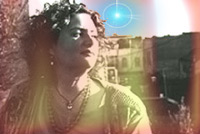 Webs of Power:
Webs of Power:
Notes from the Global Uprising
by Starhawk, New Society Publishers
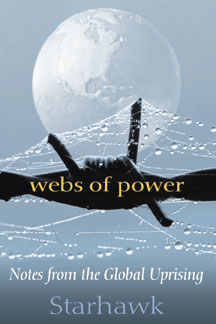 It would be wonderful to think that Sky and CNN and their ilk would broadcast the work of reporters like Starhawk. A typical report would go like this:
After the last day of the womenís training, we go home with Arish to her village of Sarda, open the door in the blank cement wall that faces the street, and enter a walled garden, with mint and fava beans, fig trees and grape vines, sages and roses lining the paths. In front of the house is a wide porch, and on the sides and back are courtyards. Arish brings us inside, to sit and drink tea and admire a perfect model of the Al Aqsa Mosque made by her brother, the engineer. Arish is young, in her early twenties, not yet married, an artist and writer. She shows us her drawings of her nieces and her mother, she has a round, bronze face and half-moon eyes that crinkle up as she smiles. Then the women beckon us out back, and we crowd onto a low bench in a small, cement-block outbuilding. In one corner is a sunken oven, heaped with coals and ashes from burning olive pumice, what's left after the oil is pressed. Arishís mother presides, patting out flat slabs of dough, and Arish removes the lid which has a long, vertical handle so they can lay them in the pit, replace the cover, and heap the ashes on. After just a few moments, the bread is done. Wide sheets of flat bread dripping with olive oil, with flat leaves of zata sandwiched in, and thin pasties of crisp, sweet bread basted with honey. They fill our hands with it, and we eat as tea is poured. Itís a warm, intimate womenís space, heated by the oven, like a sauna or a sweat lodge, and we laugh and smile and eat. I have seen clay models of this oven in sculptures thousands of years old. Generations of women have patted the dough, baked the bread, gathered at these hearths to gossip and laugh - a warm and womblike female space in a male world. I feel so safe, so welcomed, that Iím lulled into being happy, a feeling I just canít shake as the afternoon goes on. In spite of the harsh realities weíve been discussing in the training, the techniques for self-protection when facing tear gas, sound bombs, rubber bullets, beatings, the ominous approach of the Wall that will shatter the fabric of these villages, the overwhelming oppressive realities of the occupation, something strong and sweet as this honey bread survives. For a little while longer.
Sadly this is the not the kind of report you are likely to see on Sky or CNN. But don't despair. Reports like this one from the West Bank form the thread of Starhawk's wonderfully titled book, where she does what she does very well - recording the daily lives and actions of people on the front line of the global rising. These writings are the stuff of real soap-opera, not the one manufactured by the world's power brokers.
Review: RA
It would be wonderful to think that Sky and CNN and their ilk would broadcast the work of reporters like Starhawk. A typical report would go like this:
After the last day of the womenís training, we go home with Arish to her village of Sarda, open the door in the blank cement wall that faces the street, and enter a walled garden, with mint and fava beans, fig trees and grape vines, sages and roses lining the paths. In front of the house is a wide porch, and on the sides and back are courtyards. Arish brings us inside, to sit and drink tea and admire a perfect model of the Al Aqsa Mosque made by her brother, the engineer. Arish is young, in her early twenties, not yet married, an artist and writer. She shows us her drawings of her nieces and her mother, she has a round, bronze face and half-moon eyes that crinkle up as she smiles. Then the women beckon us out back, and we crowd onto a low bench in a small, cement-block outbuilding. In one corner is a sunken oven, heaped with coals and ashes from burning olive pumice, what's left after the oil is pressed. Arishís mother presides, patting out flat slabs of dough, and Arish removes the lid which has a long, vertical handle so they can lay them in the pit, replace the cover, and heap the ashes on. After just a few moments, the bread is done. Wide sheets of flat bread dripping with olive oil, with flat leaves of zata sandwiched in, and thin pasties of crisp, sweet bread basted with honey. They fill our hands with it, and we eat as tea is poured. Itís a warm, intimate womenís space, heated by the oven, like a sauna or a sweat lodge, and we laugh and smile and eat. I have seen clay models of this oven in sculptures thousands of years old. Generations of women have patted the dough, baked the bread, gathered at these hearths to gossip and laugh - a warm and womblike female space in a male world. I feel so safe, so welcomed, that Iím lulled into being happy, a feeling I just canít shake as the afternoon goes on. In spite of the harsh realities weíve been discussing in the training, the techniques for self-protection when facing tear gas, sound bombs, rubber bullets, beatings, the ominous approach of the Wall that will shatter the fabric of these villages, the overwhelming oppressive realities of the occupation, something strong and sweet as this honey bread survives. For a little while longer.
Sadly this is the not the kind of report you are likely to see on Sky or CNN. But don't despair. Reports like this one from the West Bank form the thread of Starhawk's wonderfully titled book, where she does what she does very well - recording the daily lives and actions of people on the front line of the global rising. These writings are the stuff of real soap-opera, not the one manufactured by the world's power brokers.
Review: RA
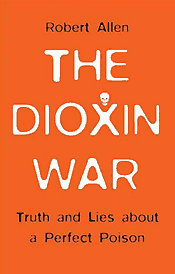 The Dioxin War:
The Dioxin War:
Truth and Lies About a Perfect Poison
by Robert Allen, Pluto Press
Robert Allen is himself an activist, not just a journo. He has been involved personally in many anti-toxics campaigns. This book potentially could have come out in one form or another at any time in the last decade. And more are there to be written on some aspect or another of the relevant elements of the world we live in, as so many aspects of it are tied in to changing the aspects you see here. And you will want to change them (there, of course, is another problem, especially as Pluto are a relatively small and political publisher - how many people who pick up and read this book will not already number themselves amongst those who want change and have their ideas how to get it?).
Books like this may teach more of us without the pain and heartache. Critical mass can be reached. It is a learning process and little about the journey offers comfort.
As Robert Allen puts it: "To know the dioxin story it is also important to understand how the chemical industry works, how scientists reach their conclusions, how governments and regulatory agencies function, how environmentalists agitate and how we as consumers ultimately fuel the system that is poisoning us."
Review: TB
Extracted from earlier review.
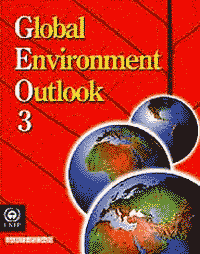 Global Environment Outlook 3:
Global Environment Outlook 3:
by UN Environment Programme, Earthscan
This book and accompanying CD ROM is an amazing compendium of facts, figures, graphs, tables, satellite photographs and descriptions of the environment and the problems we face. It gives an overview of the present crisis, and projections for the next 30 years. There is a fine description of the rise in environmental awareness since the 1960s, written from a UN/NGO point of view. A time line illustrates key events through this period; conferences and treaties. All throughout, facts are given. Global warming is speeding up, with predicted temperature rises between 1.4 C and 5.8 C over the 21st century. Three million people die every year from water related diseases.
The results of scientific research are tabulated, but also presented visually, as with the startling photograph of the ozone hole on page 213, reaching up to Chile. Yet, disgracefully, America has opted out of the Kyoto Protocols. The 1997-98 El Nino is frequently referred to, and many statistics about this are given. Africa produces less that 3.5% of global emissions, but there were droughts in 1973-74, 1984-85, 1987, 1992-94, 1999-2000, and the continent bears many of the consequences of global warming. Cars and industrialization bring respiratory diseases in cities like Lagos. Floods caused by El Nino result in water supply contamination, which in turn starts cholera outbreaks. Then there is the Asian brown cloud. 12 out of the 15 world's worst polluted cities are in Asia.
The book divides the world up into colour coded regions - Europe, Africa, Eastern Europe, Latin America, Asia Pacific, North America, West Asia, the Polar Regions. This helps keep the problems in slightly more manageable portions, but there is still this sense we are being overwhelmed. A graph in the North American section [p 231] shows, not just that the temperatures are rising, but also that the extreme peaks and troughs of hot and cold diverge wildly from the centre of the trend. The climate is less stable.
It is not possible to do full justice to this book in such a short review. The facts, figures and graphs, all collected together, put about as much environmental information into one package as it is possible to handle. It is well presented, and clear to understand. Every school and college, every public library ought to have one. If we are to act to try to stop environmental damage, we need information and analysis. A lot of what we need is right here. Buy it!
Review: SB
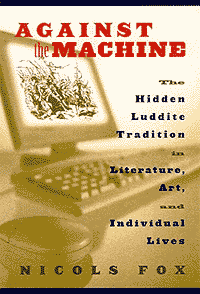 Against the Machine:
Against the Machine:
The Hidden Luddite Tradition in Literature, Art, and Individual Lives
by Nicols Fox, Island Press
"I am a Luddite!" Such was the scandalous proclamation Wendell Berry bellowed in 1993 at the first official gathering of the new technology critics in the United States. For the time the statement was bold and heretical. Since the rebellion (and demise) of the original Luddites at the launch of the industrial revolution some 180 years earlier, this new wave had been constrained by an intellectual context forged by the winners of the earlier conflict and their reformist historians: the term "Luddite" had been made into a dirty word, a put-down, a brazen denigration.
Everyone laughed - Wendell was, as always, preposterously right-on - and everyone breathed in relief. Langdon Winner. Stephanie Mills. Godfrey Reggio. Helena Norberg-Hodge. John Mohawk. Kirkpatrick Sale. Jerry Mander. Martha Crouch. Sigmund Kvaloy. Vandana Shiva. For us a deep-seated taboo had been broken: without further excuse we were going to be who we were. To boot, our work - which up until that meeting had been conducted by isolated individuals - could move forward enriched by a hearty collection of hearts and minds.
At the same time, other activists and thinkers - alternative-technology inventors, native and land-based peoples favoring traditional livelihoods, monkey-wrenchers, anarchists, and modern rebels against the future - were boldly challenging technology with their own words and actions. The upshot: the proclamation "I am a Luddite" re-entered the vernacular.
This is the intellectual context into which Nicols Fox's Against the Machine arrives. Fox comes to her ideas about machine-based society through a labyrinthean tour. She is a journalist and essayist, having previously written on such diverse topics as granite quarrying, censorship, and food. An ever-so brief reference to a body of literature paralleling the Luddite rebellion in Kirk's Rebels against the Future set Fox on this current exploration, and indeed her eclectic/elastic mind has offered up a treasure: Against the Machine is a truly scandalous book.
Against the Machine is perhaps most scandalous for the historical basis it lays to the issues you and I face in a world shaped by techno-economic forces every bit as consequential as those of industrialism. The dissent of the Luddites, it turns out, is not so very different from our own passions, longings, and interpretations. Indeed, Fox's method is to lift the veil between contemporary critics, rebels, and prophets and the many comrades who preceded us. She goes looking for modern-day Luddites, and she finds them - hauling hazel sticks in Cornwall; teaching values at Schumacher College; weaving in Barnsville, Ohio; making art on the Maine seacoast - bringing us right back to ourselves. And so we are left with a historically-informed and presently-embodied appreciation for Wendell Berry's boldness.
Look out: Against the Machine is subversive material, reminiscent in scope and intelligence of the work of yet another technology critic, Lewis Mumford. Luminous, lyrical, impassioned, profound - I had to put the book down every few paragraphs and breathe in relief.
Review: CG
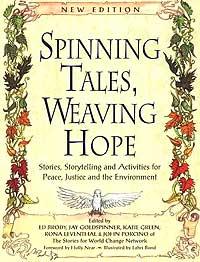 Spinning Tales, Weaving Hope:
Spinning Tales, Weaving Hope:
Stories, Storytelling and Activities for Peace, Justice and the Environment
by (edited by) Ed Brody, Jay Goldspinner, Katie Green, Rona Leventhal and John Porcino of The Stories for World Change Network and illustrated by Lahri Bond, New Society Publishers
The role of imagination, of storytelling, of song and ballad has never been more relevant in the world today as our lives become atomised and removed from the security and wisdom of the extended community. Many societies around the world - in the western as well as the southern and eastern hemispheres - have found a void in their midst as their young flee from land-based communities into the urban environments to seek work.
Yet despite this fragmentation of community, of family, of close knit communal life, there are signs that the tradition and art of storytelling is coming back, with the primary focus of healing as well as the essential function of passing wisdom from the elders to the youngers. Macroom in west Cork in southern Ireland once had a rich tradition of song, ballad and storytelling. Throughout the 1990s, as the country's elites embraced globalisation and the population sought out personal debt to service consumerist addictions, Macroom's young gradually re-discovered storytelling. Now it is flourishing again, as it is in many communities around the world.
This book, first published in 1992 - becoming a sought-after classic in the schoolroom and among activists who understand why stories touch the soul, is a digest of stories (29 in all) with accompanying "follow-up activities". They are aimed at children but will and should appeal to "adult children". They concern life and life's impact on our lives. At heart they are about wisdom and the oral tradition of communication, something that has been gradually dying out in the world of reality tv, sound bites and speech. This book is proof that, in the USA at least, the art of storytelling is not dead.
Review: RB
Reviewers:
RA - Robert Allen
TB - Tim Barton
SB - Steve Booth
ED - …anna Dowling
EV - Eric Valencic
CG - Chellis Glendinning
RR - Rob Ray
This page is available for sponsorship
|
|


 One No, many Yeses
One No, many Yeses
 Kingsnorth has the repetitive habit of ending every other paragraph with a short, romantically revolutionary phrase, along the lines of: What Kalle Lasn calls the second American Revolution - a struggle to decommodify The People - appears to have begun.
These little passages, as unnecessary as they are unrealistic, infest the entire text and are indicative of the overall problem that rather than a book of any insight, he has written a champagne socialist's travel guide.
Apparently aiming his work at the younger, idealist members of the anti-capitalist movement, Kingsnorth travelled across five continents, talking to revolutionaries and reformists, staying briefly with them and documenting what they thought their parts of the anti-globalisation movement were all about.
Alongside the obligatory statistics on world hunger, poverty, and the disparity of wealth, he offers an appraisal - one which is already becoming out of date - of where it's all going and where it all came from.
Unfortunately Kingsnorth fails as a historian, writing vapid, misleading backgrounds on the World Social Forum, Seattle, Genoa, and the history of struggle itself.
He fails as a theoretician, spouting revolutionary jargon while spending most of the last chapter of his book calling for a relatively timid reform of some existing institutions, rather than truly challenge the power structures backing their inhumanity.
He certainly fails as an analyst of what he has seen, offering only trite and patronising sympathy with third and second world poverty from his high edifice as a worldly-wise westerner.
He sidelines anarchism, happily talking about the violence of the black blocs, while mentioning people he likes as those who 'claim' to be anarchists. As he talks admiringly about the non-hierarchical basis of the anti-globalisation movement, this airbrushing forms a large black hole in One No, many Yeses' makeup.
Where his work succeeds, and importantly so, is as a source of useful information and as a series of journalistic case studies.
He has a knack of getting hold of interesting activists throughout his travels. He has an impressive network of contacts and no small amount of bravery in tracking down people who have been on the run for years in countries with extremely repressive regimes.
There are some interesting insights from the people he talks to, though Kingsnorth himself has almost no merit when trying to translate those words into his world view.
Although his research seems questionable, particularly with regards to how the Seattle riots functioned, on the assumption the people he is talking to have explained their situations to him, the background on countries such as South Africa and particularly Papua are invaluable for the stark illustrations they present of how some aspects of capitalism work, and can be overcome.
What kept me reading was the volume of firsthand sources he found, and the information they gave him, but donít expect a 'gripping, engaging and inspiring' (according to George Monbiot) classic.
Review: RR
Kingsnorth has the repetitive habit of ending every other paragraph with a short, romantically revolutionary phrase, along the lines of: What Kalle Lasn calls the second American Revolution - a struggle to decommodify The People - appears to have begun.
These little passages, as unnecessary as they are unrealistic, infest the entire text and are indicative of the overall problem that rather than a book of any insight, he has written a champagne socialist's travel guide.
Apparently aiming his work at the younger, idealist members of the anti-capitalist movement, Kingsnorth travelled across five continents, talking to revolutionaries and reformists, staying briefly with them and documenting what they thought their parts of the anti-globalisation movement were all about.
Alongside the obligatory statistics on world hunger, poverty, and the disparity of wealth, he offers an appraisal - one which is already becoming out of date - of where it's all going and where it all came from.
Unfortunately Kingsnorth fails as a historian, writing vapid, misleading backgrounds on the World Social Forum, Seattle, Genoa, and the history of struggle itself.
He fails as a theoretician, spouting revolutionary jargon while spending most of the last chapter of his book calling for a relatively timid reform of some existing institutions, rather than truly challenge the power structures backing their inhumanity.
He certainly fails as an analyst of what he has seen, offering only trite and patronising sympathy with third and second world poverty from his high edifice as a worldly-wise westerner.
He sidelines anarchism, happily talking about the violence of the black blocs, while mentioning people he likes as those who 'claim' to be anarchists. As he talks admiringly about the non-hierarchical basis of the anti-globalisation movement, this airbrushing forms a large black hole in One No, many Yeses' makeup.
Where his work succeeds, and importantly so, is as a source of useful information and as a series of journalistic case studies.
He has a knack of getting hold of interesting activists throughout his travels. He has an impressive network of contacts and no small amount of bravery in tracking down people who have been on the run for years in countries with extremely repressive regimes.
There are some interesting insights from the people he talks to, though Kingsnorth himself has almost no merit when trying to translate those words into his world view.
Although his research seems questionable, particularly with regards to how the Seattle riots functioned, on the assumption the people he is talking to have explained their situations to him, the background on countries such as South Africa and particularly Papua are invaluable for the stark illustrations they present of how some aspects of capitalism work, and can be overcome.
What kept me reading was the volume of firsthand sources he found, and the information they gave him, but donít expect a 'gripping, engaging and inspiring' (according to George Monbiot) classic.
Review: RR
 Chiva:
Chiva:  Without Blood
Without Blood

 Arguments Against G8
Arguments Against G8
 Aimed at Britain's neo-liberals rather than a general audience, Arguments Against G8 indicts the usual suspects, the men who lead the G8 group of nations - Britain, Canada, France, Germany, Italy, Japan, Russia and the United States. It has been compiled by two academics, David Miller, Professor of Sociology at the University of Strathclyde, who is also a co-founder of the media monitor,
Aimed at Britain's neo-liberals rather than a general audience, Arguments Against G8 indicts the usual suspects, the men who lead the G8 group of nations - Britain, Canada, France, Germany, Italy, Japan, Russia and the United States. It has been compiled by two academics, David Miller, Professor of Sociology at the University of Strathclyde, who is also a co-founder of the media monitor,  Off the Map:
Off the Map:

 Skewed
Skewed
 Webs of Power:
Webs of Power: It would be wonderful to think that Sky and CNN and their ilk would broadcast the work of reporters like Starhawk. A typical report would go like this:
After the last day of the womenís training, we go home with Arish to her village of Sarda, open the door in the blank cement wall that faces the street, and enter a walled garden, with mint and fava beans, fig trees and grape vines, sages and roses lining the paths. In front of the house is a wide porch, and on the sides and back are courtyards. Arish brings us inside, to sit and drink tea and admire a perfect model of the Al Aqsa Mosque made by her brother, the engineer. Arish is young, in her early twenties, not yet married, an artist and writer. She shows us her drawings of her nieces and her mother, she has a round, bronze face and half-moon eyes that crinkle up as she smiles. Then the women beckon us out back, and we crowd onto a low bench in a small, cement-block outbuilding. In one corner is a sunken oven, heaped with coals and ashes from burning olive pumice, what's left after the oil is pressed. Arishís mother presides, patting out flat slabs of dough, and Arish removes the lid which has a long, vertical handle so they can lay them in the pit, replace the cover, and heap the ashes on. After just a few moments, the bread is done. Wide sheets of flat bread dripping with olive oil, with flat leaves of zata sandwiched in, and thin pasties of crisp, sweet bread basted with honey. They fill our hands with it, and we eat as tea is poured. Itís a warm, intimate womenís space, heated by the oven, like a sauna or a sweat lodge, and we laugh and smile and eat. I have seen clay models of this oven in sculptures thousands of years old. Generations of women have patted the dough, baked the bread, gathered at these hearths to gossip and laugh - a warm and womblike female space in a male world. I feel so safe, so welcomed, that Iím lulled into being happy, a feeling I just canít shake as the afternoon goes on. In spite of the harsh realities weíve been discussing in the training, the techniques for self-protection when facing tear gas, sound bombs, rubber bullets, beatings, the ominous approach of the Wall that will shatter the fabric of these villages, the overwhelming oppressive realities of the occupation, something strong and sweet as this honey bread survives. For a little while longer.
Sadly this is the not the kind of report you are likely to see on Sky or CNN. But don't despair. Reports like this one from the West Bank form the thread of Starhawk's wonderfully titled book, where she does what she does very well - recording the daily lives and actions of people on the front line of the global rising. These writings are the stuff of real soap-opera, not the one manufactured by the world's power brokers.
Review: RA
It would be wonderful to think that Sky and CNN and their ilk would broadcast the work of reporters like Starhawk. A typical report would go like this:
After the last day of the womenís training, we go home with Arish to her village of Sarda, open the door in the blank cement wall that faces the street, and enter a walled garden, with mint and fava beans, fig trees and grape vines, sages and roses lining the paths. In front of the house is a wide porch, and on the sides and back are courtyards. Arish brings us inside, to sit and drink tea and admire a perfect model of the Al Aqsa Mosque made by her brother, the engineer. Arish is young, in her early twenties, not yet married, an artist and writer. She shows us her drawings of her nieces and her mother, she has a round, bronze face and half-moon eyes that crinkle up as she smiles. Then the women beckon us out back, and we crowd onto a low bench in a small, cement-block outbuilding. In one corner is a sunken oven, heaped with coals and ashes from burning olive pumice, what's left after the oil is pressed. Arishís mother presides, patting out flat slabs of dough, and Arish removes the lid which has a long, vertical handle so they can lay them in the pit, replace the cover, and heap the ashes on. After just a few moments, the bread is done. Wide sheets of flat bread dripping with olive oil, with flat leaves of zata sandwiched in, and thin pasties of crisp, sweet bread basted with honey. They fill our hands with it, and we eat as tea is poured. Itís a warm, intimate womenís space, heated by the oven, like a sauna or a sweat lodge, and we laugh and smile and eat. I have seen clay models of this oven in sculptures thousands of years old. Generations of women have patted the dough, baked the bread, gathered at these hearths to gossip and laugh - a warm and womblike female space in a male world. I feel so safe, so welcomed, that Iím lulled into being happy, a feeling I just canít shake as the afternoon goes on. In spite of the harsh realities weíve been discussing in the training, the techniques for self-protection when facing tear gas, sound bombs, rubber bullets, beatings, the ominous approach of the Wall that will shatter the fabric of these villages, the overwhelming oppressive realities of the occupation, something strong and sweet as this honey bread survives. For a little while longer.
Sadly this is the not the kind of report you are likely to see on Sky or CNN. But don't despair. Reports like this one from the West Bank form the thread of Starhawk's wonderfully titled book, where she does what she does very well - recording the daily lives and actions of people on the front line of the global rising. These writings are the stuff of real soap-opera, not the one manufactured by the world's power brokers.
Review: RA
 The Dioxin War:
The Dioxin War: Global Environment Outlook 3:
Global Environment Outlook 3:
 Against the Machine:
Against the Machine: Spinning Tales, Weaving Hope:
Spinning Tales, Weaving Hope: